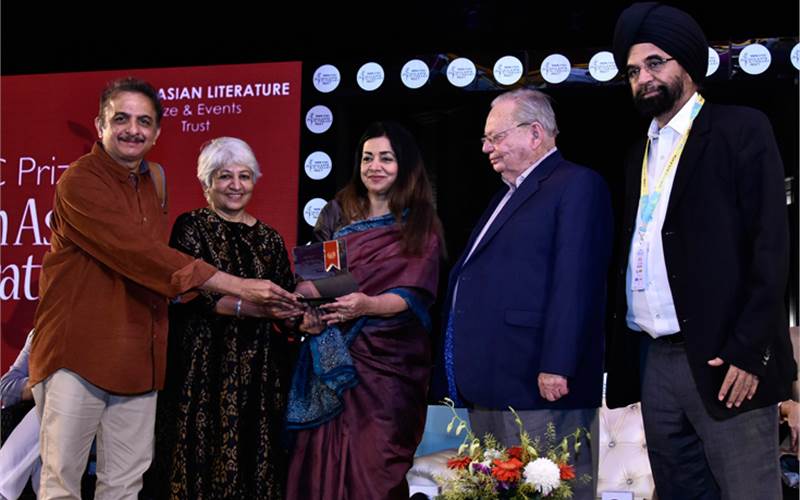Translation of Kannada author Jayant Kaikini wins USD 25,000 DSC Prize 2018
‘No Presents Please’, originally written in Kannada by noted author Jayant Kaikini and translated into English by eminent translator Tejaswini Niranjana, has been announced as the winner of the prestigious DSC Prize for South Asian Literature 2018 at the Tata Steel Kolkata Literary Meet in Kolkata.
28 Jan 2019 | By Dibyajyoti Sarma
The DSC Prize has always encouraged writing in regional languages and translations, and this is the first time that a translated work has won the prize. This magnificent book gives us a protagonist that is vivid yet full of contradictions, spirited yet lonely, embattled yet big-hearted — the city of Mumbai. Empathy and survival are the constant, co-dependent themes that unify every strand of this extraordinary book, creating a shimmering mosaic of a conflicted city that is as kind as it is, at times, cruel.
In a glittering award ceremony, the USD 25,000 DSC Prize was awarded to Jayant Kaikini and Tejaswini Niranjana, along with a unique trophy by eminent writer Ruskin Bond. As per the prize process, the prize money would be equally shared between the author and the translator.
The six shortlisted authors and books in contention for the DSC Prize this year were Jayant Kaikini: No Presents Please (Translated by Tejaswini Niranjana, Harper Perennial, HarperCollins India), Kamila Shamsie: Home Fire (Riverhead Books, USA and Bloomsbury, UK), Manu Joseph: Miss Laila Armed And Dangerous (Fourth Estate, HarperCollins, India), Mohsin Hamid: Exit West (Riverhead Books, USA and Hamish Hamilton, Penguin Random House, India), Neel Mukherjee: A State Of Freedom (Chatto & Windus, Vintage, UK and Hamish Hamilton, Penguin Random House, India) and Sujit Saraf: Harilal & Sons (Speaking Tiger, India)
Jury chair Rudrangshu Mukherjee, speaking on behalf of the jury, said, “The jury decided to award the DSC Prize for South Asian Literature 2018 to ‘No Presents Please’ by Jayant Kaikini, which has been translated by Tejaswini Niranjana and published by Harper Perennial. The jury was deeply impressed by the quiet voice of the author through which he presented vignettes of life in Mumbai and made the city the protagonist of a coherent narrative. The Mumbai that came across through the pen of Kaikini was the city of ordinary people who inhabit the bustling metropolis. It is a view from the margins and all the more poignant because of it. This is the first time that this award is being given to a translated work and the jury would like to recognise the outstanding contribution of Tejaswini Niranjana, the translator.”
Administered by the South Asian Literature Prize & Events Trust, the DSC Prize for South Asian Literature has helped to raise the profile of South Asian writing around the world by rewarding authors who write about the region. The DSC Prize for South Asian Literature which was instituted in 2010, is an established international literary prize that awards the best work in South Asian fiction writing each year. The past winners have been from various countries and their work has reflected the importance of South Asian culture and literature.
Surina Narula, MBE and co-founder of the DSC Prize said, “My heartfelt congratulations to author Jayant Kaikini and translator Tejaswini Niranjana for winning the DSC Prize for South Asian Literature 2018 for their brilliant book ‘No Presents Please’. It was a pleasure reading the shortlist. The challenges faced by the authors to weave their protests against the wave of anti-globalisation into their writings of seemingly harmless pieces of literature could be seen through their work, migration being a major theme this year. The DSC Prize has completed eight years and reading South Asian literature written in English, including translations, has enabled larger global audiences to understand the issues globalisation has brought about. The jury as usual has to do the difficult task of selecting the better amongst the best.”












 See All
See All